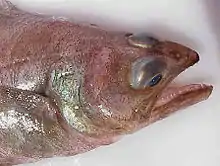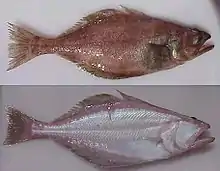Arrowtooth flounder
The arrowtooth flounder (Atheresthes stomas) is a fish in the family Pleuronectidae. It can be caught from the Bering Sea to Santa Rosa Island, California. At present, it is the most common fish in the Gulf of Alaska. Data is insufficient for many of the flounder's general traits, including size and age of sexual maturity.[1] Spawning is known to occur from December through February and the species can live up to 27 years.[2]
| Arrowtooth flounder (Atheresthes stomias) | |
|---|---|
 | |
 | |
| Scientific classification | |
| Kingdom: | Animalia |
| Phylum: | Chordata |
| Class: | Actinopterygii |
| Order: | Pleuronectiformes |
| Family: | Pleuronectidae |
| Genus: | Atheresthes |
| Species: | A. stomias |
| Binomial name | |
| Atheresthes stomias | |
| Synonyms | |
| |
| Wikimedia Commons has media related to Atheresthes stomias. |
If not properly handled, the flesh of an arrowtooth flounder can soften, due to a proteolytic enzyme which is emitted from a myxosporean parasite that softens the flesh when heated, lowering value and marketability. To make it more marketable, arrowtooth is usually sold on the West Coast as turbot, although it is not related to the true turbot. Additives have been created to combat the softening of flesh, creating economic feasibility for the catching of the flounder.[1]
References
- "Arrowtooth Flounder Research". Alaska Fisheries Science Center. National Oceanic and Atmospheric Administration. Retrieved January 11, 2021.
- "Arrowtooth Flounder". NOAA Fisheries. National Oceanic and Atmospheric Administration. Retrieved January 11, 2021.
External links
- Froese, Rainer and Pauly, Daniel, eds. (2012). "Atheresthes stomias" in FishBase. October 2012 version.
- Commercial Utilization of Arrowtooth Flounder